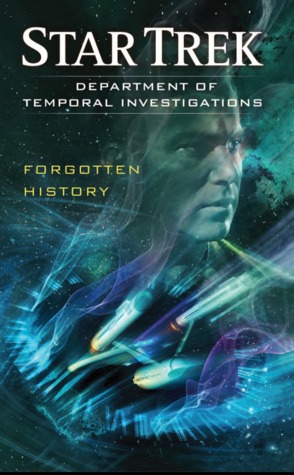 Forgotten History (Star Trek: Department of Temporal Investigations, #2) by Christopher L. Bennett
Forgotten History (Star Trek: Department of Temporal Investigations, #2) by Christopher L. Bennett Format: ebook
Source: purchased from Amazon
Formats available: paperback, ebook
Genres: science fiction, space opera, Star Trek, time travel
Series: Star Trek: Department of Temporal Investigations #2
Pages: 350
Published by Pocket Books on May 1, 2012
Purchasing Info: Author's Website, Publisher's Website, Amazon, Barnes & Noble, Kobo, Bookshop.org, Better World Books
Goodreads
The agents of the Department of Temporal Investigations are assigned to look into an anomaly that has appeared deep in Federation territory. It's difficult to get clear readings, but a mysterious inactive vessel lies at the heart of the anomaly, one outfitted with some sort of temporal drive disrupting space-time and subspace. To the agents' shock, the ship bears a striking resemblance to a Constitution-class starship, and its warp signature matches that of the original Federation starship Enterprise NCC-1701--the ship of James T. Kirk, that infamous bogeyman of temporal investigators, whose record of violations is held up by DTI agents as a cautionary tale for Starfleet recklessness toward history. But the vessel's hull markings identify it as Timeship Two, belonging to none other than the DTI itself. At first, Agents Lucsly and Dulmur assume the ship is from some other timeline . . . but its quantum signature confirms that it came from their own past, despite the fact that the DTI never possessed such a timeship. While the anomaly is closely monitored, Lucsly and Dulmur must search for answers in the history of Kirk's Enterprise and its many encounters with time travel--a series of events with direct ties to the origins of the DTI itself. . . .
My Review:
Today is Star Trek Day. Why? Because, once upon a time in a galaxy not far away at all, on this day in 1966, the very first episode of Star Trek, now referred to as Star Trek: The Original Series, because it WAS, premiered on television thanks in no small part to the efforts of Gene Roddenberry AND Lucille Ball.
Today is also, and coincidentally, the 50th anniversary of the premiere of Star Trek: The Animated Series.
Those combined anniversaries make this the perfect day to review the second book in the Star Trek: Department of Temporal Investigations series, Forgotten History. Because, as you might have guessed from the cover, this pseudo-history takes a deep, deep dive into the many, many times that Captain James T. Kirk either created or was caught up in a temporal disturbance.
From the perspective of DTI Agent Gariff Lucsly, the ENTIRE purpose of the DTI was to prevent anyone else, particularly any other starship captain, from messing about with time as much or as often as Kirk did.
Because Kirk had so damn many up close and personal encounters with time travel that it could be said they had a ‘friends with benefits’ relationship. Or, considering the events involving the Guardian of Forever, perhaps that relationship might be better referred to as ‘frenemies with benefits’.
There certainly WERE benefits – as even the DTI generally considers saving the planet to have been a benefit. They just wish that they didn’t owe it to their departmental nemesis so many damn times.
The story in Forgotten History begins with what seems to be incontrovertible evidence that Kirk played fast and loose with the stability of the Federation’s timeline on at least one more occasion, and a much bigger occasion at that, than the SEVENTEEN times that the DTI was previously aware of.
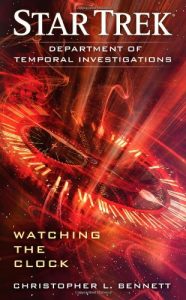 But Kirk, for all of his temporal escapades, and in spite of the way that DTI investigates the ways and means in which time looks back on itself, is more than a century in their rear view mirror. So to speak. And as DTI Agents Lucsly and Dulmur discovered in the first book in the DTI series, Watching the Clock, the events that make it into the history books – or the official records – may have only the barest resemblance to what really happened.
But Kirk, for all of his temporal escapades, and in spite of the way that DTI investigates the ways and means in which time looks back on itself, is more than a century in their rear view mirror. So to speak. And as DTI Agents Lucsly and Dulmur discovered in the first book in the DTI series, Watching the Clock, the events that make it into the history books – or the official records – may have only the barest resemblance to what really happened.
So the story that we, and the DTI Agents, begin with is a tale about a captain who ran roughshod through history and established procedure and was allowed to get away with it. (Which he very often did and was.)
But perhaps not in this case. Only time will tell.
Escape Rating B: The story of Forgotten History, and the history that was deliberately forgotten, is wrapped around the creation of not one but two legends, and the purpose the creations of those legends was intended to serve.
Which means that this is a story that goes back in time to show just the events which shaped both of those legends.
One, of course, is the legendary career of Captain (later Admiral, later Captain again) James Tiberius Kirk and the successful completion of the USS Enterprise’s five-year mission under his command. A five-year mission where even in its first year the ship had three encounters with time travel – at least by the DTI’s count.
They’d already set the record – and they hadn’t even gotten started.
Which is where the other legend came in. Because the Enterprise and her crew were playing with things that no one understood, Starfleet needed to get a handle on time travel before it got a handle on them. Leading, eventually and in a more roundabout and bureaucratic way than anyone imagined, to the formation of the Department of Temporal Investigations under the direction of its Founder and first Director, Dr. Meijan Grey.
How those two legends, and their legacies, impacted each other AND Starfleet is what lies at the heart of this book.
In order to reach the point in the ‘present’ that gives that impact its full weight, the book puts itself and the reader through a LOT of the history of Kirk, Grey and the DTI. In the process of putting that history into the hands and minds of the readers, there’s a heaping helping of infodumping to cover every temporal infraction Kirk and the Enterprise ever committed, every DTI response, and every bit of political and bureaucratic shenanigans going on behind the scenes and under the table to serve agendas that Kirk turns out not to be nearly as on board with as legend would have it.
Unfortunately, that necessary infodump really drags the pace of the story for the first half. It was a terrific bit of nostalgia, and I enjoyed a fair bit of it, but it takes the action and adventure out of a series that has always been blissfully full to the brim with both – even when the plot of the episode was humorous, thought-provoking, or both.
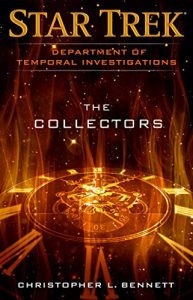 Which means that, while I did like Forgotten History quite a bit, a good bit of that is due to the high nostalgia factor in going back to the era of The Original Series, both in the stories and characters themselves and that I watched the final season as it was broadcast in 1968-69 with my dad.
Which means that, while I did like Forgotten History quite a bit, a good bit of that is due to the high nostalgia factor in going back to the era of The Original Series, both in the stories and characters themselves and that I watched the final season as it was broadcast in 1968-69 with my dad.
But as a story, Forgotten History wasn’t nearly as much fun as Watching the Clock, which just plain moved a whole lot faster and enjoyed a tighter focus on its central mystery in spite of its greater length. Still, I liked them both more than enough that I just picked up the rest of the DTI series, and will probably dive into the next book, The Collectors, whenever I’m next in the mood for a bit of Trek.

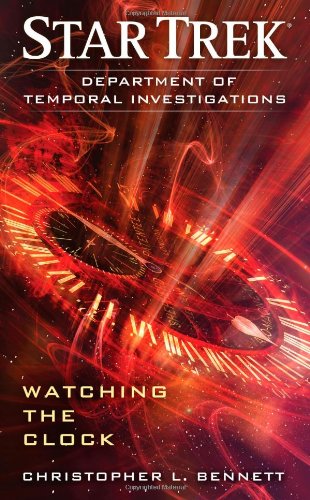 Watching the Clock (Star Trek: Department of Temporal Investigations #1) by
Watching the Clock (Star Trek: Department of Temporal Investigations #1) by 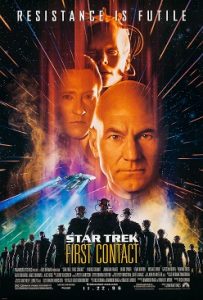 Which sounds a lot like what the Borg were attempting in
Which sounds a lot like what the Borg were attempting in